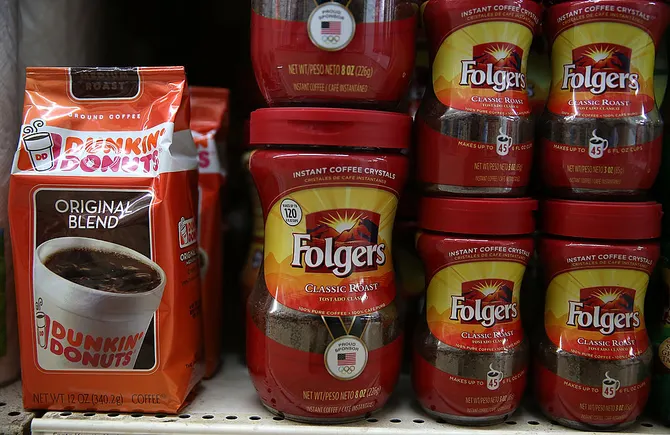Dive Transient:
- J.M. Smucker Co. plans to hike espresso costs for the fourth time since June 2024 as tariffs elevate the price of espresso bean imports, in response to a June 10 earnings name.
- Espresso bean sourcing is the first driver of direct materials prices associated to tariffs for Smucker, per the earnings name. The corporate primarily procures its unroasted espresso beans from Brazil and Vietnam, alongside different international locations, as it’s “an unavailable pure useful resource” domestically, CFO Tucker Marshall mentioned on an earnings Q&A.
- “The present U.S. tariff impression on inexperienced espresso is our largest publicity that we’ll handle on high of navigating record-high prices for the commodity,” CEO Mark Smucker instructed buyers.
Dive Perception:
Smucker buys about 500 million kilos of inexperienced espresso yearly, making it the corporate’s largest tariff-impacted import, in response to the earnings name. Outdoors of espresso, many of the firm’s U.S. manufacturing is sourced domestically.
The corporate didn’t focus on pricing for particular manufacturers, however the firm’s most generally distributed coffees embody Folgers, Dunkin’ and Café Bustelo, in response to the corporate’s web site.
Smucker’s areas of tariff publicity additionally embody exports to international locations with retaliatory tariffs, foreign-made merchandise shipped to the U.S. and capital gadgets made exterior the nation and utilized in its U.S. manufacturing vegetation, Marshall mentioned.
“This has been factored into our outlook, and we’re working to mitigate these value will increase by a mix of other sourcing methods, provide chain optimization, and accountable pricing,” Smucker added.
Retaliatory tariffs from Canada, the place Smucker sells peanut butter, ice cream toppings and occasional, contribute to greater prices, together with merchandise co-manufactured exterior the U.S., resembling liquid espresso and moist cat meals, Marshall mentioned.
Additionally, capital items purchased for manufacturing vegetation carry tariffs, since they largely come from the European Union, the CFO mentioned.
“The upper prices have required worth will increase throughout our enterprise, and we anticipate the value elasticity of demand might stay elevated into 2026 as customers proceed to expertise broader inflationary pressures and are selective of their spending,” the corporate mentioned in a securities submitting.
Firms within the meals and beverage business have struggled with pricing because of the uncertainty of tariff-related negotiations between the U.S. and its buying and selling companions. The Campbell’s Co., for instance, is contemplating “surgical pricing actions” whereas working with suppliers to dampen the impression of tariffs. Others, resembling Basic Mills, Tyson Meals and Coca-Cola, have warned of potential impression on their backside line.
Dive Transient:
- J.M. Smucker Co. plans to hike espresso costs for the fourth time since June 2024 as tariffs elevate the price of espresso bean imports, in response to a June 10 earnings name.
- Espresso bean sourcing is the first driver of direct materials prices associated to tariffs for Smucker, per the earnings name. The corporate primarily procures its unroasted espresso beans from Brazil and Vietnam, alongside different international locations, as it’s “an unavailable pure useful resource” domestically, CFO Tucker Marshall mentioned on an earnings Q&A.
- “The present U.S. tariff impression on inexperienced espresso is our largest publicity that we’ll handle on high of navigating record-high prices for the commodity,” CEO Mark Smucker instructed buyers.
Dive Perception:
Smucker buys about 500 million kilos of inexperienced espresso yearly, making it the corporate’s largest tariff-impacted import, in response to the earnings name. Outdoors of espresso, many of the firm’s U.S. manufacturing is sourced domestically.
The corporate didn’t focus on pricing for particular manufacturers, however the firm’s most generally distributed coffees embody Folgers, Dunkin’ and Café Bustelo, in response to the corporate’s web site.
Smucker’s areas of tariff publicity additionally embody exports to international locations with retaliatory tariffs, foreign-made merchandise shipped to the U.S. and capital gadgets made exterior the nation and utilized in its U.S. manufacturing vegetation, Marshall mentioned.
“This has been factored into our outlook, and we’re working to mitigate these value will increase by a mix of other sourcing methods, provide chain optimization, and accountable pricing,” Smucker added.
Retaliatory tariffs from Canada, the place Smucker sells peanut butter, ice cream toppings and occasional, contribute to greater prices, together with merchandise co-manufactured exterior the U.S., resembling liquid espresso and moist cat meals, Marshall mentioned.
Additionally, capital items purchased for manufacturing vegetation carry tariffs, since they largely come from the European Union, the CFO mentioned.
“The upper prices have required worth will increase throughout our enterprise, and we anticipate the value elasticity of demand might stay elevated into 2026 as customers proceed to expertise broader inflationary pressures and are selective of their spending,” the corporate mentioned in a securities submitting.
Firms within the meals and beverage business have struggled with pricing because of the uncertainty of tariff-related negotiations between the U.S. and its buying and selling companions. The Campbell’s Co., for instance, is contemplating “surgical pricing actions” whereas working with suppliers to dampen the impression of tariffs. Others, resembling Basic Mills, Tyson Meals and Coca-Cola, have warned of potential impression on their backside line.












